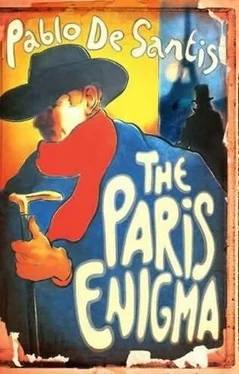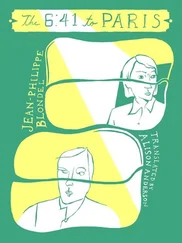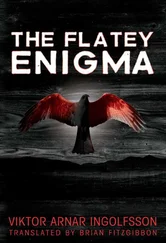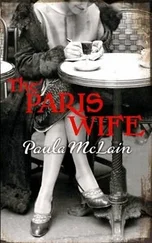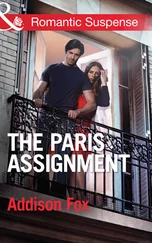“It seems to be genuine, but I’m afraid Kalidán bought the passage just to throw us off track. I’m sure that if we pay a visit to the shipping company they’ll tell us that cabin berth remained empty.”
Craig turned the paper over. He studied the footprint on the edge.
“Kalidán pushed the paper under the trunk with his foot. Here is the mark. You’re a shoemaker-”
I was surprised Craig knew that about me. I had never told him.
“The son of a shoemaker.”
“But you can tell me what type of shoe it is.”
I didn’t take me more than a few seconds to come up with a response.
“It’s the print from a sailor’s shoe.”
“Are you positive?”
I pointed to the pale lines on the paper. I was happy to be able to show Craig something, although I wasn’t convinced that it was something he didn’t already know.
“It is a shoe with wide lasts, and grooves to grip the deck’s slippery surface. I think he disguised himself as a sailor so he could blend in with the crew and not be discovered.” I didn’t really believe that was true, but it seemed like an appropriate comment for an assistant to make.
Craig accepted my effort and then said victoriously, “That’s not it at all. He dressed up as a sailor so he could find lodging at the port and wait until things calmed down before leaving the city. He could easily support himself with his skill at cards.”
Craig’s face was well known in the city, and he didn’t like disguises, so it was up to me to scour the disreputable bars in the port area. In these places with stagnant air and weak light, sailors tried to escape the tedium of their travels with the tedium of terra firma; they pretended to listen to accordion players who played too slowly, or pianists who played too fast; they pretended to talk to women whose faces, in the light of day or a moment of clarity, would have terrified them. In tiny rooms they trafficked in trinkets, foreign money, ambiguous words, opium, and infectious diseases.
I went into the bars trying to see without being seen. I was searching for Kalidán’s face using an exercise of the imagination: I had to strip him of his Hindu complexion and the bright aura he used to attract attention onstage, and add instead a beard and hats and cloaks and the furtive expression of someone who wishes he could make himself invisible. I tried to strike up conversations with the men who seemed most harmless, but it was hard to trust anyone. A Portuguese man who kept talking about his poor mother stabbed some unlucky guy who had dared to correct him when he mispronounced the name of a ship; a shy, calm dwarf, with a scar across his forehead, ripped into the stomach of a drunk who made fun of his condition. No one punished these crimes. I continued to see the Portuguese guy, and the dwarf too, which made me think that they all must have a few murders under their belts, but since they were in some sort of international territory, no one cared.
I had trouble getting away from the sailors’ unintelligible conversations, the greedy women who went through my pockets, and the police spies who looked at me suspiciously. But two weeks later, when I had gotten used to getting drunk every night, I heard a rumor about a French captain who was winning a fortune at cards.
He played in a gambling den that was above a grocery warehouse. Through the dirty windows movement could be seen, but there was no way I could get in, as two formidable ruffians guarded the entrance. I waited in the drizzle for the fake French captain to finish gathering his winnings and head home. He finally came out, sunken into his cloak and beardless. What distinguished him from Kalidán the magician wasn’t his disguise but some sort of inner confidence that he couldn’t be seen, as if all he had to do was concentrate and he would become invisible. I followed from a distance, carefully, imitating drunken zigzags. He didn’t turn to look at me; he walked with sure steps, immune to the effects of alcohol or fear. He was stopped only by a black cat, which he didn’t want to cross his path. Then he went into a dilapidated house that looked like it was about to collapse.
In the morning, so early that my father wouldn’t even have been in his workshop, I went to visit Craig. It didn’t matter what time I stopped by; he was always awake. I told him of my discovery and described the building’s slow collapse; I warned him that in the world of the port nothing lasted long.
“You’ve done a good job. But now it’s my turn. I sent one boy to his death and I don’t want to send another.”
Before the door closed completely, I thought I saw Craig smile, for the first time in weeks.
reporter from The Nation
Five days later Craig brought together in the Green Room the journalists who had defamed him. There was the, pale and freckled, who was never without a pad and pencil, as if at any moment the perfect sentence was going to jump out and surprise him. The journalist from The Tribune was a man about thirty years old, indigenous looking, who affected gentlemanly manners but it was said that when he got some good information, he sold it to the highest bidder. Another journalist, so tall that he spent his life bent like a question mark, worked for a newspaper in Montevideo, where the case had been followed with interest. There were also three people I had never seen before; I imagined they’d been sent by the Alarcón family.
“As I promised, the case has been solved. As we feared, Gabriel Alarcón is dead. His corpse was found in the basement of the Victoria Theater. The police are taking it away as we speak. The body was covered in lime to hasten the decomposition process.”
“How did you find it?”
“I cannot explain methods that would forewarn criminals and teach them how to proceed in the future so as not to leave clues. But I can tell you that Kalidán, as you know him, or Jean Baptiste Cral, his real name, was an epileptoid criminal who suffered morbid attacks, with a pathological fear of growing old. He believed that drinking human blood would keep him young forever. He was so sure that his crimes would go unpunished that he kept a trophy from each one of his victims.”
Craig opened a large, square box, like those that women use to store their hats.
“Alarcón was prepared to stop his crimes and, against my advice, became his assistant. He took advantage of his proximity to search for evidence about the murders; he found the collection of souvenirs from Kalidán’s victims. Unfortunately, he allowed himself to be dazzled by the magician’s skills.”
Craig pulled a dull medallion, a scapular, a bit of lace, and a lock of hair tied with a yellow ribbon out of the box. “These macabre treasures gave Alarcón the illusion that he had solved the case; but the magician discovered what he was doing and killed him. He drank his blood just as he had the women’s. Then he made the body disappear.”
The journalists took notes as fast as they could; Craig had shrewdly called this meeting at the end of the day so they wouldn’t have time to ask too many questions, since they were already due back at their editorial offices. The moment they left, the detective seemed to lose all his strength and he collapsed into a chair with his head in his hands.
It seemed best to leave him in peace, but I had a thousand questions. Didn’t I, his assistant, deserve an explanation of the method that had enabled him to reconstruct the story? Since he didn’t respond to my questions, I put my hand on his shoulder. Physical contact was something that Craig couldn’t stand, but I was experiencing a maddening curiosity, the satiation of which would make even Alarcon’s gruesome murder seem like a gift.
“It’s true,” he said, sitting up with a piqued expression on his face.
Читать дальше
